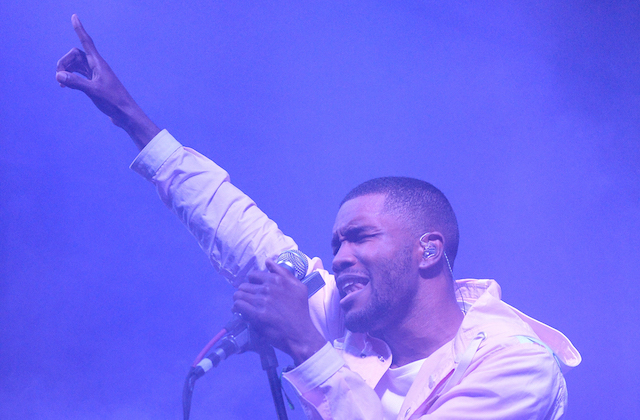Frank Ocean's New Albums Didn't Shake the World, and That's Totally Fine

Back in 1974 when they appeared together on “The Mike Douglas Show,” Muhammad Ali and a seemingly intoxicated Sly Stone added an interesting chapter to the still-ongoing debate about how and when celebrities of color, especially Black ones, should use their platform to take critical aim at America’s vitriolic racism.
“The only think we can do for brothers is to do what we’re doing: be examples, and to be ‘hee-hee-hee’ happy, and to be intelligent, like you are and like you always say,” said Stone after interrupting Ali’s comments about Black entertainers smiling and “clowning” for American audiences.
I can’t ignore or reduce the impact of those Black entertainers most exalted by White neoliberal institutions—athletes, musicians, actors, comedians whoever—who use their platforms to stand against the forces hurting their communities. Yet I also couldn’t help but think about the subtext to Stone’s possibly stoned proclamation—that Black entertainers need only show how great they are to the world—while absorbing Frank Ocean’s new albums, “blond” and “Endless.” Both works ultimately left me wondering, “…cool, but that’s what we waited four years for?
To be clear, the two albums, released exclusively on Apple Music, stand on their own and together as remarkable music. The discernible song snippets on the 45-minute visual album, “Endless,” are as lush as any of the transitions on 2011’s “Nostalgia, Ultra” and 2012’s “Channel Orange.” And minus its $1,000 print magazine accompaniment, “blond” is as evocative as Ocean’s previous offerings.
Ocean’s talent for mixing ethereal soundscapes with R&B fundamentals shines throughout “blond.” The singer/songwriter repurposes the musical themes of Beyoncé (“Pink + White”), Kendrick Lamar (“Skyline To”) and even The Beatles (“White Ferrari” and “Sigfried”) with a soft paintbrush rather than a paintball gun. And, personally, I can’t stop listening to the organ-and-voice minimalism on “Godspeed,” which echoes the same desire for absolution as “Bad Religion.” Clearly, fans agree with critics’ enthusiastic assessment of "blond": According to Billboard, it’s the third-largest debut of 2016.
But the landscape has changed during Ocean’s four years of false starts. During this time, prominent Black entertainers delivered clear-cut calls of empowerment in the face of overt racist violence. In 2014, Killer Mike sent up police shootings on Run the Jewels’ brutal “RTJ2.” Lamar assured us we’d be “Alright” on 2015’s “To Pimp a Butterfly.” And Beyoncé…well, you already know about “Lemonade.”
This year, both Kanye West’s “The Life of Pablo” and Chance the Rapper’s “Coloring Book” employed gospel themes to deliver uplifiting messages of salvation while both artists addressed activism and police violence in their respective media appearances.
Add to that the star-studded “Justice for Flint” benefit in February, Jesse Williams’ amazing BET Awards speech, and the anti-police violence stances of Carmelo Anthony, LeBron James and numerous WNBA players, and it’s clear the Black Lives Matter movement’s message has deeply affected America’s collective imagination.
To be fair, Ocean has used his Tumblr account to make political statements such as his lament over homophobic and transphobic violence after the Pulse Orlando massacre. And on the “blond” album opener, “Nikes,” (the avant-garde, NSFW video you can see above) invokes the memory of Trayvon Martin: “Pour up for A$AP, RIP Pimp C/R.I.P. Trayvon, that nigga look just like me,” he sings in tribute. On “Solo (Reprise),” Outkast’s equally reclusive Andre 3000 admits feeling “So low that I can admit/When I hear that another kid is shot by the popo/It ain’t an event no more” on his guest verse.
But does it make sense to expect Ocean, who jumpstarted a new conversation about masculinity in hip-hop, and who seemingly released the artsy “Endless” as a fuck-you to his label before independently releasing “blond,” to justify his four-year absence with a “woke” album of the times?
Personally, I always want more political engagement from celebrities with the clout to offer it, but I don’t think that’s Ocean’s problem. Power and resistance come in many forms besides the most obvious ones. Art need not, and should not, show all its cards to have a big impact.
That's why Ocean’s greatest weapon is his ambiguity. Even the “blond” album title embodies what Darnell L. Moore calls a critique of “the industry’s, and larger society’s, reliance on [W]hiteness, maleness, heterosexuality, and US centeredness” in an Afropunk piece. Ocean needn’t stick within any boundaries—he can mystify, blur his muse’s gender on any song, incorporate rock alongside gospel, and boast about sex while yearning for deeper connection. And he can do it all without making radio hits.
People who make political demands on Black artists don’t tend to do this with White artists, even as they pull from Black culture in equal measure. We could ask James Blake, the White English singer/songwriter who appears on “blond,”“Endless” and “Lemonade,” why he’s not standing up for Black lives. We could ask the same of Radiohead, whose guitarist, Jonny Greenwood, contributed to “Endless.” But who’s going to do that and actually compel a response?
After at least 10 cover-to-cover listens, I think “Endless” and “blond” are like stones in a lake casting ripples that grow bigger and change shape. Maybe in six months, after 10,000 more spins, I can retrospectively call these albums game-changers on par with “Channel Orange.” But right now, they’re as beautiful, enticing and transgressive as they need to be.
